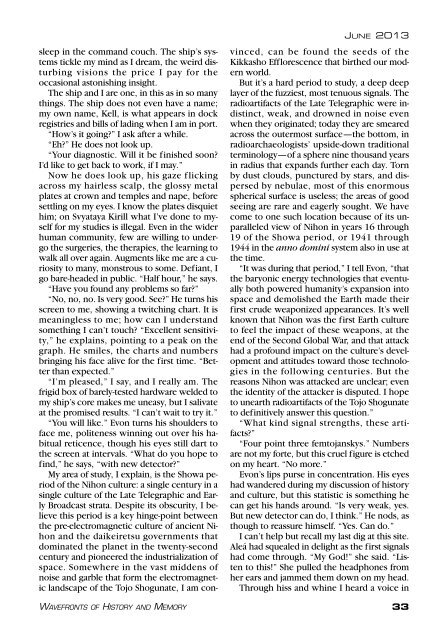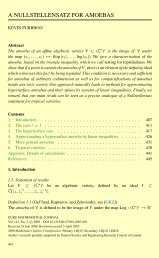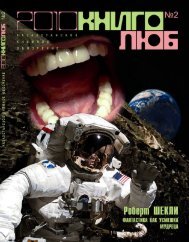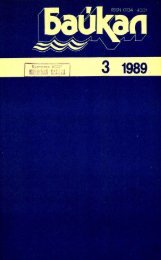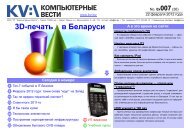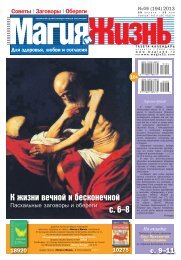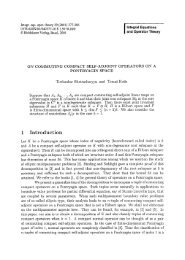Analog Science Fiction and Fact - June 2013
Analog Science Fiction and Fact - June 2013
Analog Science Fiction and Fact - June 2013
You also want an ePaper? Increase the reach of your titles
YUMPU automatically turns print PDFs into web optimized ePapers that Google loves.
sleep in the comm<strong>and</strong> couch. The ship’s systems<br />
tickle my mind as I dream, the weird disturbing<br />
visions the price I pay for the<br />
occasional astonishing insight.<br />
The ship <strong>and</strong> I are one, in this as in so many<br />
things. The ship does not even have a name;<br />
my own name, Kell, is what appears in dock<br />
registries <strong>and</strong> bills of lading when I am in port.<br />
“How’s it going?” I ask after a while.<br />
“Eh?” He does not look up.<br />
“Your diagnostic. Will it be finished soon?<br />
I’d like to get back to work, if I may.”<br />
Now he does look up, his gaze flicking<br />
across my hairless scalp, the glossy metal<br />
plates at crown <strong>and</strong> temples <strong>and</strong> nape, before<br />
settling on my eyes. I know the plates disquiet<br />
him; on Svyataya Kirill what I’ve done to myself<br />
for my studies is illegal. Even in the wider<br />
human community, few are willing to undergo<br />
the surgeries, the therapies, the learning to<br />
walk all over again. Augments like me are a curiosity<br />
to many, monstrous to some. Defiant, I<br />
go bare-headed in public. “Half hour,” he says.<br />
“Have you found any problems so far?”<br />
“No, no, no. Is very good. See?” He turns his<br />
screen to me, showing a twitching chart. It is<br />
meaningless to me; how can I underst<strong>and</strong><br />
something I can’t touch? “Excellent sensitivity,”<br />
he explains, pointing to a peak on the<br />
graph. He smiles, the charts <strong>and</strong> numbers<br />
bringing his face alive for the first time. “Better<br />
than expected.”<br />
“I’m pleased,” I say, <strong>and</strong> I really am. The<br />
frigid box of barely-tested hardware welded to<br />
my ship’s core makes me uneasy, but I salivate<br />
at the promised results. “I can’t wait to try it.”<br />
“You will like.” Evon turns his shoulders to<br />
face me, politeness winning out over his habitual<br />
reticence, though his eyes still dart to<br />
the screen at intervals. “What do you hope to<br />
find,” he says, “with new detector?”<br />
My area of study, I explain, is the Showa period<br />
of the Nihon culture: a single century in a<br />
single culture of the Late Telegraphic <strong>and</strong> Early<br />
Broadcast strata. Despite its obscurity, I believe<br />
this period is a key hinge-point between<br />
the pre-electromagnetic culture of ancient Nihon<br />
<strong>and</strong> the daikeiretsu governments that<br />
dominated the planet in the twenty-second<br />
century <strong>and</strong> pioneered the industrialization of<br />
space. Somewhere in the vast middens of<br />
noise <strong>and</strong> garble that form the electromagnetic<br />
l<strong>and</strong>scape of the Tojo Shogunate, I am con-<br />
WAVEFRONTS OF HISTORY AND MEMORY<br />
JUNE <strong>2013</strong><br />
vinced, can be found the seeds of the<br />
Kikkasho Efflorescence that birthed our modern<br />
world.<br />
But it’s a hard period to study, a deep deep<br />
layer of the fuzziest, most tenuous signals. The<br />
radioartifacts of the Late Telegraphic were indistinct,<br />
weak, <strong>and</strong> drowned in noise even<br />
when they originated; today they are smeared<br />
across the outermost surface—the bottom, in<br />
radioarchaeologists’ upside-down traditional<br />
terminology—of a sphere nine thous<strong>and</strong> years<br />
in radius that exp<strong>and</strong>s further each day. Torn<br />
by dust clouds, punctured by stars, <strong>and</strong> dispersed<br />
by nebulae, most of this enormous<br />
spherical surface is useless; the areas of good<br />
seeing are rare <strong>and</strong> eagerly sought. We have<br />
come to one such location because of its unparalleled<br />
view of Nihon in years 16 through<br />
19 of the Showa period, or 1941 through<br />
1944 in the anno domini system also in use at<br />
the time.<br />
“It was during that period,” I tell Evon, “that<br />
the baryonic energy technologies that eventually<br />
both powered humanity’s expansion into<br />
space <strong>and</strong> demolished the Earth made their<br />
first crude weaponized appearances. It’s well<br />
known that Nihon was the first Earth culture<br />
to feel the impact of these weapons, at the<br />
end of the Second Global War, <strong>and</strong> that attack<br />
had a profound impact on the culture’s development<br />
<strong>and</strong> attitudes toward those technologies<br />
in the following centuries. But the<br />
reasons Nihon was attacked are unclear; even<br />
the identity of the attacker is disputed. I hope<br />
to unearth radioartifacts of the Tojo Shogunate<br />
to definitively answer this question.”<br />
“What kind signal strengths, these artifacts?”<br />
“Four point three femtojanskys.” Numbers<br />
are not my forte, but this cruel figure is etched<br />
on my heart. “No more.”<br />
Evon’s lips purse in concentration. His eyes<br />
had w<strong>and</strong>ered during my discussion of history<br />
<strong>and</strong> culture, but this statistic is something he<br />
can get his h<strong>and</strong>s around. “Is very weak, yes.<br />
But new detector can do, I think.” He nods, as<br />
though to reassure himself. “Yes. Can do.”<br />
I can’t help but recall my last dig at this site.<br />
Aleá had squealed in delight as the first signals<br />
had come through. “My God!” she said. “Listen<br />
to this!” She pulled the headphones from<br />
her ears <strong>and</strong> jammed them down on my head.<br />
Through hiss <strong>and</strong> whine I heard a voice in<br />
33


